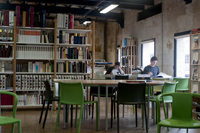| Titre : | Theaster Gates | | Type de document : | texte imprimé | | Auteurs : | Carol Becker, Auteur ; Lisa Yun Lee (1969-), Auteur ; Achim Borchardt-Hume, Auteur | | Editeur : | London : Phaidon | | Année de publication : | cop. 2015 | | Collection : | Contemporary artists | | Importance : | 1 vol. (158 p.) | | Présentation : | ill. en coul., couv. ill. en coul. | | Format : | 30 cm | | ISBN/ISSN/EAN : | 0-7148-6880-9 | | Prix : | 39,95 EUR | | Langues : | Anglais (eng) | | Index. décimale : | MON Monographie | | Résumé : | Theaster Gates (Chicago, 1973, where he lives and works) has developed an expanded artistic practice that includes space development, object making, performance and critical engagement with many publics. Gates transforms spaces, institutions, traditions, and perceptions. His training as an urban planner and sculptor, and subsequent time spent studying clay, has given him keen awareness of the poetics of production and systems of organizing. Playing with these poetic and systematic interests, Gates has assembled gospel choirs, formed temporary unions, and used systems of mass production as a way of underscoring the need that industry has for the body. |
Theaster Gates [texte imprimé] / Carol Becker, Auteur ; Lisa Yun Lee (1969-), Auteur ; Achim Borchardt-Hume, Auteur . - London : Phaidon, cop. 2015 . - 1 vol. (158 p.) : ill. en coul., couv. ill. en coul. ; 30 cm. - ( Contemporary artists) . ISBN : 0-7148-6880-9 : 39,95 EUR Langues : Anglais ( eng) | Index. décimale : | MON Monographie | | Résumé : | Theaster Gates (Chicago, 1973, where he lives and works) has developed an expanded artistic practice that includes space development, object making, performance and critical engagement with many publics. Gates transforms spaces, institutions, traditions, and perceptions. His training as an urban planner and sculptor, and subsequent time spent studying clay, has given him keen awareness of the poetics of production and systems of organizing. Playing with these poetic and systematic interests, Gates has assembled gospel choirs, formed temporary unions, and used systems of mass production as a way of underscoring the need that industry has for the body. |
|  |


 Ajouter le résultat dans votre panier Affiner la recherche
Ajouter le résultat dans votre panier Affiner la rechercheTheaster Gates / Carol Becker


